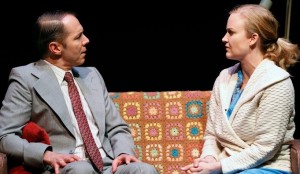The broken pieces of public education are laid bare in Fish, a world premiere drama by Kia Corthron presented by the Keen Company. Set in an unnamed high school, the play captures the ails of urban education, the poverty-stricken neighborhoods in which they sit, and the resulting challenges students experience as they try to keep their heads above water.
Crumbs from the Table of Joy
Lynn Nottage. Author of a Pulitzer-winning masterpiece (Sweat), another Pulitzer winner (Ruined), a wild phantasmagorical comedy with revealing things to say about the underclass (Clyde’s), a heartrending miniature she also skillfully adapted into an opera (Intimate Apparel), and several others. Who wouldn’t want to see a little-known early work of hers? Not for nothing is Keen Company promoting Crumbs from the Table of Joy as “the Lynn Nottage play you don’t know (yet).”
This Space Between Us
This Space Between Us contains the opposite of an 11 o’clock number. The nonmusical scene late in the play is a showstopper all right, though not in the rousing good sense. Rather, all action and dialogue literally stop while two characters stand over an air mattress as it inflates. It lasts ... well, however long it takes an air mattress to inflate, which may only be about a minute but seems a lot longer, since the audience has to sit there and wait out this unnecessary moment in a show that has already worn out its welcome.
Blues for an Alabama Sky
Blues for an Alabama Sky, by Pearl Michelle Cleage, has been around for 25 years, but only now has the Keen Company given it a New York debut. Still, Cleage’s work, about black artists struggling in 1930, during the Harlem Renaissance, is as relevant today as it was a quarter-century ago. Poverty, discrimination, abortion rights, violence, and the everyday hustle to make it are still real issues in 2020.
Surely Goodness and Mercy
Grace, blessings, and charity can come from the most unlikely sources and individuals. This is the central premise of Chisa Hutchinson’s Surely Goodness and Mercy, in which a precocious 12-year-old boy and a cantankerous school lunch lady are a pair of unlikely saviors. Set in Newark, N.J., the play shows that amid the grit and grime of urban life, simple acts of benevolence can have reverberating and profound effects.
Ordinary Days
The trials and tribulations of living in New York City are explored in Ordinary Days, a sweet and thoughtful musical exploring the alternating wonder and frustration of life in the Big Apple. Currently being presented by Keen Company at Theatre Row, Ordinary Days chronicles four New Yorkers in 2007 as they navigate their everyday lives while pondering their larger futures.
Later Life
Is middle age too late for an earth-moving romance between a Bostonian with Brahmin reserve and a Midwesterner for whom grand passion is essential? In Later Life, the 1993 hit comedy revived by the Keen Company, playwright A.R. Gurney dramatizes this question with characteristic wit and capacious heart. Gurney, who grew up affluent in Buffalo, N.Y., carved a niche for himself Off-Broadway with a handful of urbane comedies—notably The Dining Room and The Cocktail Hour—whose characters have origins similar to his own. When Gurney died last June at age 86, he left a legacy of 49 plays, plus operas, musicals, and novels.
Lonely Planet
Jody and Carl, the only characters in Lonely Planet, are habitués of a sleepy little shop called Jody’s Maps in an unnamed American city. These middle-aged men, intricately rendered in Steven Dietz’s subtle, elegiac script, are being realized vividly by New York stage veterans Arnie Burton and Matt McGrath in a Keen Company production celebrating the 25th anniversary of the play’s premiere at Northlight Theatre in Evanston, Ill. Lonely Planet, winner of the PEN Center USA Award for Drama, was written when the arts were being defoliated by an epidemic beyond the American medical community’s control. AIDS is the background of the play, but not its subject.
tick, tick...BOOM!
For the late Rent composer Jonathan Larson, the “tick, tick, boom” in his head were the sounds signaling the passage of time as he matured and yet struggled to achieve success in the theater. Although Tick, Tick… BOOM! was originally written as a highly autobiographical solo piece, it was reworked after Larson’s death and the success of Rent to include two more characters, a girlfriend and a roommate. Fans of his 1996 hit rock musical are likely to thoroughly enjoy the Keen Company production of Tick, Tick… BOOM!
Boy vs. Girl vs. Boy
The hot-button issue of gender identity is at the center of Anna Ziegler’s Boy, a troubling and moving new play, and the first world premiere from the Keen Company since 2008. The subject of sexuality is in the zeitgeist, from a new musical, Southern Comfort, about Georgia transsexuals, currently at the Public Theater, to civic debates about restroom accommodations.
The story that Ziegler presents falls on the serious side. During circumcision, one of a set of twins was horribly mutilated, losing his penis. His distraught parents write to a doctor who appeared on 60 Minutes and specializes in gender identity to seek help. He advises them to raise the infant, named Samuel, as a girl, Samantha.
Ziegler tells her story in flashback, starting at the moment Adam, who was born Samuel but raised as Samantha and reinvented himself as a man, meets a girl named Jenny (Rebecca Rittenhouse) at a Halloween party. Jenny is someone Samantha knew in school and shared a class with. Jenny doesn’t recognize Adam, for obvious reasons, but he feels a strong attraction to her.
Bobby Steggert invests Adam with a mixture of well-meaning sweetness and a tentative confidence that sometimes leads him astray. His initial meeting with Jenny goes awry when she confesses having a 4-year-old child and he says he likes children and would be glad to give the kid a lift. It puts Jenny on guard, but it’s symptomatic of Adam’s failure to fully socialize himself. And, without using makeup or drag, Steggert gently creates a little girl, crossing his ankles or pitching his voice slightly higher, or talking quickly, as children do. The plan of Sam’s parents, Doug and Trudy (Ted Köch and Heidi Armbruster), is to socialize him as a girl until he is old enough to have operations to create a vagina. But even with Dr. Wendell Barnes’s coaching, Sam feels innately more interest in bugs, cars, and traditional “boy” interests.
The play comes down strongly in favor of nature prevailing over nurture. That brings it in line with the idea that being gay or transgender is not some perversion of the natural order. Indeed, the perversion in Boy is clearly the mentality of Dr. Barnes (Paul Niebanck), the eminence who persuades Doug and Trudy to maneuver Sam into the opposite sex. Sandra Goldmark’s unremarkable furniture nonetheless provides a striking visual parallel to the psychology: second sets of furnishings hang upside down over the set, a visual parallel to Samantha's inversion.
Even misguided, Niebanck’s doctor is a touching figure, a self-possessed gay man (he calls himself “a former boy who didn’t quite fit in”) who means to do well and cares in his way for Sam. Yet Niebanck invests the doctor with a sense that he is perhaps too doctrinaire in his theories. A climactic scene when Adam confronts Dr. Barnes and reveals that he has become a man, thanks to operations, is quietly devastating for both characters.
Ziegler plots the course carefully, and under the direction of Linsay Firman, the flashbacks make sense and flow smoothly. As in the playwright’s last outing, A Delicate Ship, which took its title from a W.H. Auden poem, literature plays a part. Here, Dr. Barnes’s assertion that Paradise Lost is the greatest poem ever written hints at a concealed interest in playing God.
Serving as counterpoint is another poem, Leigh Hunt’s Rondeau, which Dr. Barnes introduced to Sam, that remains Adam’s favorite. Milton’s is highbrow and concerned with the ineffable; Hunt’s is quotidian and concerned with real life and the physical, and ends: “Say I’m weary/Say I’m sad/Say that health and wealth have missed me/Say I’m growing old, but add/Jenny kissed me.”
Every so often Ziegler indulges in sentimentality, notably in a late scene when Adam reveals the night his father told him about the accident. Eating ice cream in the car, Doug said: “You came out of your mother, just who you are. This kind, gentle boy.” Steggert smiles affectionately. “You shouldn’t drink so much, Dad,” he says helpfully. And the anguished Doug replies, “I know that. But sometimes we just can’t control what it is we do, can we?” When the story is done, Jenny wants to know what flavor the ice cream was. It’s a clumsy non sequitur suffused with cutesiness. But the errors are few. Even if you’ve thought you’ve heard all the arguments about the topic, Boy brings them home powerfully.
The Keen Company production of Boy runs through April 9 at the Clurman Theater (410 W. 42nd St. between 9th and 10th Aves.) in Manhattan. Evening performances are at 7 p.m. on Tuesday-Thursday and 8 p.m. on Friday and Saturday. Matinees are at 2 p.m. on Saturday and 3 p.m. on Sunday. Tickets are $62.50 and may be ordered at www.telecharge.com.















